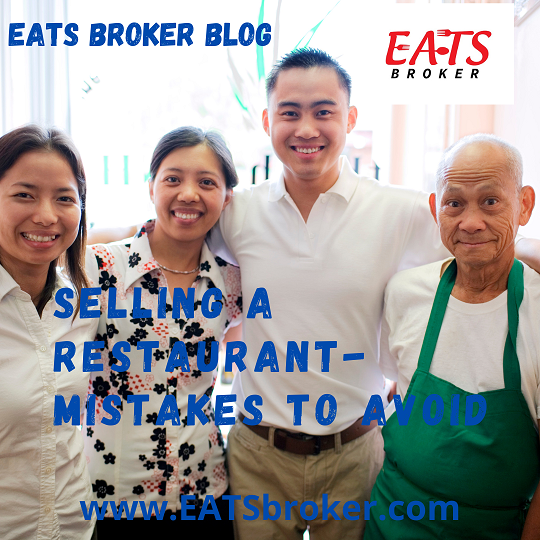If you are selling a restaurant, there are mistakes to avoid that can become obstacles to reaching the closing table. To increase the odds of a restaurant for sale getting to the closing table, the Asset Sale Purchase agreement needs to be adequately prepared by a trained professional.
The sales price is only the start of a complex negotiating process that the small details are a BIG determining factor for success. The restaurant resale process negotiations include language that must be agreed upon by both restaurant seller and restaurant buyer.
Once the price has been agreed upon, the knots and bolts of the deal still need to be finalized. Most are not familiar with the critical items that should be addressed in a purchase agreement.
EATS Restaurant Brokers are Restaurant Resale Specialist that understands the critical items on the Asset Purchase Agreement that need to be negotiated upfront between both parties. This blog will cover the essential details that should be addressed in an Asset Purchase Agreement.
Texas Restaurant Broker Dominique Maddox says, “We have a high closing rate because, after ten years as a Restaurant Broker, I have extensive training in restaurant sales negotiations. I understand the critical details to address upfront.
We recently moved our headquarters to Dallas, Texas; we are excited about helping restaurant owners in Texas to avoid mistakes that stop them from selling a restaurant and getting paid at the closing table”.
EATS Restaurant Brokers Top Mistakes to Avoid
Equipment List: The equipment list is usually an itemized list of restaurant equipment and decorations included in the restaurant sale. The list is created by the restaurant owner and provided to the interested buying parties.
The equipment list is an essential part of the restaurant valuation, Asset Purchase Agreement, and assets a buyer will receive. Buyers should understand that fixtures attached to the building belong to the landlord and not the tenant.
Grease trap, hood system, walk-in cooler, walk-in freezer, water sink, and built-in bar should not be included on an equipment list. When an Asset Purchase Agreement is fully executed, it contains a list of equipment that will transfer ownership.
Mistakes to Avoid: Check items on the equipment list to confirm ownership. Restaurant equipment is commonly rented (mainly dishwasher); a restaurant owner can’t sell something they don’t own. Read the lease to ensure the landlord does not own the equipment and the current tenant didn’t lease a fully equipped restaurant space.
Fees: Who Covers them?
Attorney Fees
Who pays the attorney fees and why? In residential real estate, it’s common for both parties to split closing attorney fees in residential real estate, or the Seller will sometimes pay the fees.
Restaurant Brokerage is different; it’s the buyer’s cost and responsibility. It’s beneficial for a restaurant buyer to pick and pay a closing attorney that understands business brokerage. A closing attorney is not needed to close a simple deal if a deal does not involve bank lending or franchise ownership transfer.
Mistake to Avoid– Choose a closing attorney that charges a flat rate compared to an hourly rate. Confirm the services the attorney will provide for the agreed price. Do not use a closing attorney that is not familiar with UCC lien searches or business brokerage deals. Always use a closing attorney for a restaurant sales transaction.
Inventory Cost:
The inventory on hand on the day of closing belongs to the buyer, but actually, they need to pay the restaurant owner first. Several buyers have a misunderstanding that the food inventory is included in the purchase price.
This understanding is far from the truth unless clarified at the beginning of the negotiations. The standard process is that an inventory count is complete the night before closing or the morning of closing. The buyer will pay inventory costs for the food items or other inventory.
Buyer and Seller take inventory together, and the buyer pays a separate check for the final sum. Occasionally a Restaurant Broker will put an estimated number on the Asset Purchase Agreement (for example, $5000). Once the inventory count is final, both parties will finalize the underpayment or overpayment for inventory.
Mistake to Avoid– Confirm restaurant owner will have a copy of recent inventory delivery invoices with current prices. I would suggest not paying for items that are almost gone.
Transfer Fee
A transfer fee is required when reselling a franchise restaurant for sale. The current restaurant owner has already agreed to this fee on the franchise on the Franchise Disclosure Document(FDD).
The transfer fee will cover the buyer’s required training, ranging from 2-10 weeks, depending on the franchise. The transfer fee does not directly go to the restaurant seller; buyers are expected to pay the transfer fee. This fee can range from $5,000-$50,000.
Mistake to Avoid– Confirm Transfer fee upfront and put language in the Asset Purchase Agreement for the party responsible for payment.
Want more help selling a restaurant? Contact Restaurant Broker Dominique Maddox at 404-993-4448 or by email at [email protected]. Visit our website at www.EATSbroker.com


